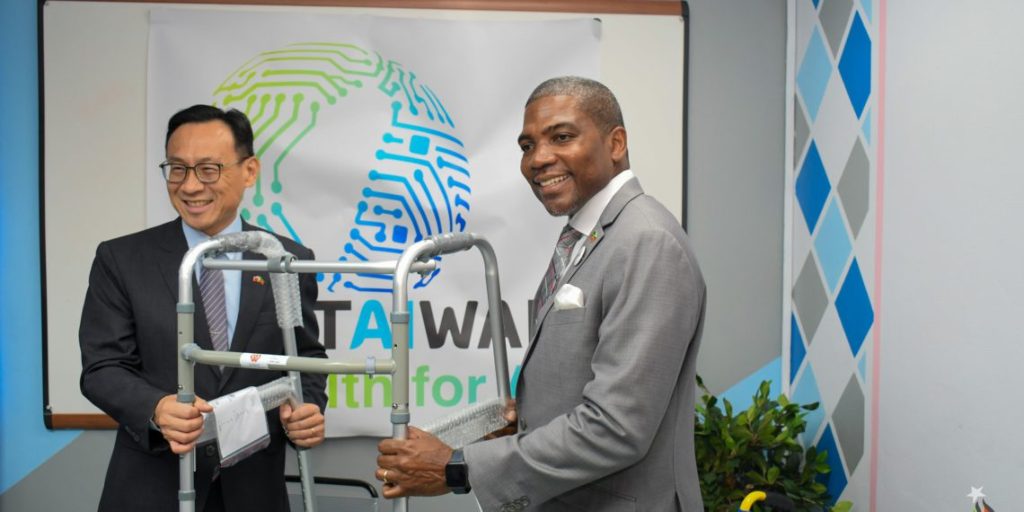Taiwan Donates Essential Medical Supplies to Saint Kitts and Nevis
The Federation of Saint Kitts and Nevis received a substantial donation of medical equipment, primarily focusing on mobility aids, from the Republic of China (Taiwan) through the Cao Zhong Zhi Foundation. This contribution underscores the enduring partnership between the two nations, with Taiwan consistently playing a crucial role in supporting Saint Kitts and Nevis’ development, particularly within the health sector. The donation, comprising over 87 wheelchairs, 36 toilet chairs, and 64 walkers, directly addresses the needs of the population by enhancing patient mobility and improving overall healthcare services. These essential resources will be distributed strategically across the islands, prioritizing the main public health facility, the Joseph N. France General Hospital, as well as other health institutions and communities with the highest need. This targeted approach ensures that the donation’s impact is maximized, reaching those who will benefit most from improved mobility and independence.
This act of generosity is not an isolated incident but rather a continuation of Taiwan’s longstanding commitment to the well-being of the people of Saint Kitts and Nevis. The donation ceremony, held at the Joseph N. France General Hospital, served as a testament to the strong bilateral relationship between the two countries. His Excellency Michael Lin, Resident Ambassador of Taiwan, expressed confidence that the Ministry of Health and the Ministry of Social Development and Constituency Empowerment will effectively distribute the donated items to those in need across the islands, ensuring equitable access to these valuable resources. Prime Minister and Minister of Health, the Honourable Dr. Terrance Drew, accepted the donation and reiterated Taiwan’s significance as a valued development partner. He emphasized the importance of these mobility aids for the people of Saint Kitts and Nevis, highlighting the positive impact they will have on individuals’ lives and the overall healthcare system.
Beyond the immediate impact of the donated equipment, this collaboration signifies a deepening partnership between the healthcare institutions of both countries. Prime Minister Drew highlighted the establishment of sub-committees between the Joseph N. France General Hospital and Taipei General Hospital. This initiative aims to facilitate direct knowledge transfer, technology sharing, and mutual support, further strengthening the healthcare capacities of both nations. This collaborative approach fosters a mutually beneficial exchange of expertise and resources, creating a platform for continuous improvement and advancement in healthcare delivery. By sharing best practices and leveraging each other’s strengths, both countries can enhance their ability to provide high-quality care to their citizens.
The donation of mobility aids and the formation of collaborative sub-committees represent a significant step towards achieving sustainable and impactful improvements in healthcare. These efforts demonstrate a commitment not only to addressing immediate needs but also to building long-term capacity and resilience within the healthcare systems. The focus on knowledge transfer and technology sharing ensures that the benefits of this collaboration extend beyond the immediate provision of equipment, creating a lasting legacy of improved healthcare infrastructure and expertise. This strategic approach recognizes the importance of investing in human capital and institutional development to achieve sustainable progress in the healthcare sector.
Furthermore, Prime Minister Drew used the occasion to advocate for Taiwan’s inclusion in international bodies such as the World Health Assembly. He underscored Taiwan’s leading role in medical development and technology, emphasizing their valuable contributions to global health. Dr. Drew argued that Taiwan’s exclusion from these crucial platforms deprives the international community of vital expertise and insights. He reiterated the call for Taiwan’s participation as a partner and collaborator, emphasizing the importance of their experience and knowledge in contributing to global health initiatives. This advocacy reflects the recognition of Taiwan’s significant advancements in healthcare and their potential to play a more substantial role in addressing global health challenges.
In conclusion, the donation of wheelchairs, toilet chairs, and walkers by Taiwan to Saint Kitts and Nevis represents more than just a transfer of medical equipment. It symbolizes a deep and enduring partnership between two nations committed to improving healthcare outcomes. The collaboration extends beyond the provision of resources to encompass knowledge sharing, technology transfer, and mutual support, fostering a sustainable and impactful approach to healthcare development. Moreover, the advocacy for Taiwan’s inclusion in international health organizations underscores the recognition of their crucial contributions to global health advancements. This multi-faceted collaboration serves as a testament to the power of international partnerships in achieving meaningful progress in healthcare and improving the well-being of individuals and communities around the world.
Share this content:












Post Comment